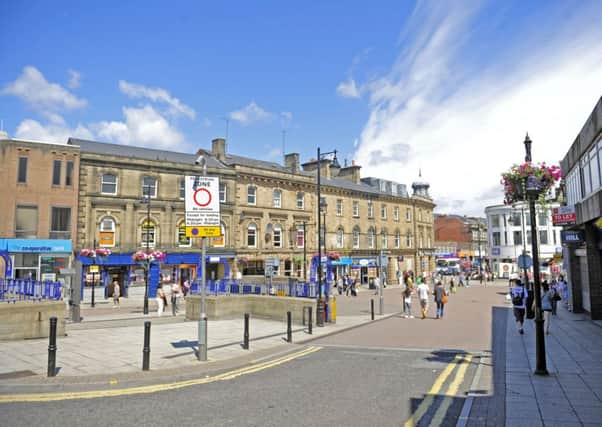‘Act now or watch our high streets die’ warning


A major new think-tank study published this morning warns that high streets in many smaller towns and cities are facing an “identity crisis” as shoppers switch to online stores in their droves, and calls for radical action from councils and central government to revitalise underused town centres.
The Future Spaces Foundation is critical of Government initiatives such as the 2011 “Portas Pilots” – which saw TV personality Mary Portas offer advice on how to improve high streets up and down the country – and says the focus must switch immediately to convincing businesses and colleges to relocate into city centres to increase local footfall.
Advertisement
Hide AdAdvertisement
Hide AdThe think-tank gives the example of Barnsley where its analysis concludes that “re-inventing” the “failed” town centre as a principal location for office-based work would have a hugely positive impact on the wider economy.
A separate report by the Commons business select committee, also published today, calls for a complete overhaul of the business rates system, with MPs urging the Government to consider whether shops should pay rates based on their turnover rather than the value of their property.
The cross-party committee is equally critical of the Portas Pilots, complaining that Ministers have been unable to say how or even whether the £2.3m funding set aside has been spent.
Committee chairman Adrian Bailey said: “This is not acceptable, and must be rectified.”
Advertisement
Hide AdAdvertisement
Hide AdThe Future Spaces Foundation think-tank – founded by architect Ken Shuttleworth and advised by a raft of top economists and retail experts – undertook studies in towns and cities across the country before concluding the fundamental mistake made by both national and local government has been to regard retail as the main focus of Britain’s city centres.
In fact, its report states, the focus should shift to encouraging offices, colleges and universities to increase their city centre presence. This in turn will massively increase weekday footfall – and so give local shops, cafés and bars the customers they need, the think-tank says.
Speaking to the Yorkshire Post, Paul Swinney, a senior economist with the foundation, said this was already happening in major cities such as Leeds and Manchester – but less so in smaller towns across the UK.
“When people think about town and city centres, they think ‘retail’ – and actually that’s a huge problem,” Mr Swinney said.
Advertisement
Hide AdAdvertisement
Hide Ad“Retail is only ever a secondary activity within a town or city centre, which feeds off the primary activities of people going to work, people living there, people coming in for education or leisure.
“What we’re seeing in smaller and medium-sized towns and cities within Yorkshire is that increasingly jobs are relocating out of town to business parks or other employment sites.”
He added: “What that means is that people get into their car in the suburbs at half past eight on a Tuesday morning and they drive even further away from the high street.
“The implication is they cannot get to the high street during the day, and so there are fewer people for retailers to sell to – and they struggle as a result.”
Advertisement
Hide AdAdvertisement
Hide AdThe issue was far greater in smaller urban centres such as Barnsley than in major cities, Mr Swinney said.
“We’re actually seeing the opposite pattern in larger cities like Leeds or Manchester, where more and more people are working and living in the city centres,” he added.
“There’s something like 80,000 private sector jobs based within Leeds city centre. That’s 80,000 people heading in every day. And you can see the result – the Trinity shopping centre opened last year and retail is booming.”
Mr Swinney was dismissive of the approach taken by Whitehall in trying to revive the high street.
Advertisement
Hide AdAdvertisement
Hide Ad“Government has not understood this – you look at something like the Portas review and it just focuses on retail,” he said. “It’s about trying to understand why businesses move out of town.
“Why are they being repelled from city centres? Part of it is about car parking, public transport, the types of property available and what they pay for them.”
The report published by the Commons business committee plays on a similar theme, concluding Britain’s “outdated” business rates regime is the “single biggest threat” to the high street.
Committee chair Mr Bailey said: “Employing around three million people, British retail is the largest private sector employer in the UK. But its traditional home – the high street – is struggling under a system of rates that comprises one of the highest forms of local property tax in the European Union.”
Advertisement
Hide AdAdvertisement
Hide AdThe committee calls for a root-and-branch review of business rates policy, perhaps moving towards a new retail tax that would stop high streets being penalised at the expense of online firms.
“Business rates are not fit for purpose,” Mr Bailey said.
British Retail Confederation director Helen Dickinson said the report is the “final nail in the coffin” for the argument that business rates do not require reform.
But a Government spokesman insisted that the coalition’s economic plan is already “working”, and pointed to the £1bn business rates support announced in last December’s autumn statement.
He also defended the Portas Pilots scheme, saying: “The 27 Portas Pilots continue doing great work promoting town centre innovation.”